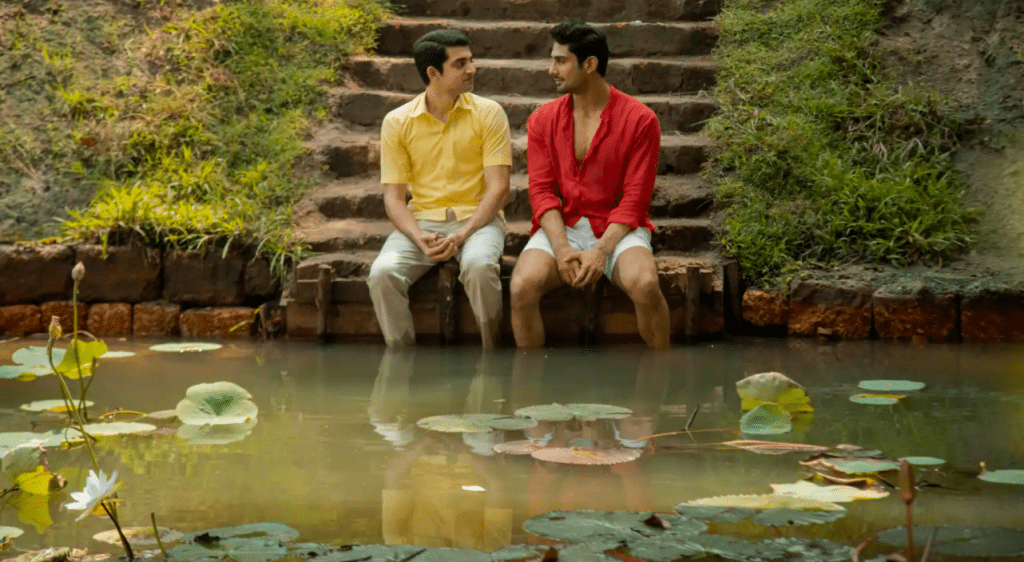
Sachin Kundalkar’s Cobalt Blue, now streaming on Netflix, further mystifies the old and numbing habit called love.
Set in Fort Kochi, Kerala in the year 1996, Cobalt Blue is the film adaptation of the Marathi novel with the same title by director. Nudged from time to time with cobalt blue colour splashes and strokes, the plot is a brilliant take on man-man and woman-man relationships through the lives of two siblings- Tanay and Anuja. Their family has reluctantly followed the father from Maharashtra in 1980. The narrative of the movie is intertwined with monologues, poems, art installations, and photographs where the physical and metaphorical absences led the siblings to gravitate towards the void, experience the distraught and then come outdone or undone.
Events unfurl as the death of their grandfather frees up a spacious and well-lit upstairs room in the house. Even as Tanay (Neelay Mehendale), who has to share a room with his brother Aseem (Anant Joshi), dreams about writing poems in the privacy of that room, his sister Anuja (Anjali Sivaraman) makes her claim. Much to the dismay of his kids, Baba decides to keep a paying guest in the spacious room.
Tanay is often seen speaking to the mysterious tortoise named after Pablo Neruda and holds on to his books and cassettes to live an alternate life. Unlike the print version where both the siblings narrate their tale with equal significance, often complementary and with the complexity of navigating through personal grief and reconciliation with self, the movie focuses more on Tanay’s attempts to make sense of his sexuality and his passions. Both the siblings fall for the enigmatic paying guest played by Prateik Babbar, who has the most powerful screen presence in the movie.
The Marathi parents have ‘American housewife’ dreams for Anuja whereas she sees herself as nothing less than a national-level hockey player. She’s a rebel and environmentalist who guards herself well from the sexist comments of her elder brother Aseem by retaliating from time to time and taunting her Aai for trying to make her fit into the kitchen. She’s also one step ahead of her father in showing hostility towards Kerala’s cultural and political milieu. While her brothers try to be apolitical and silent in carrying on with their lives, she marks her disapproval on what is concerning her about society. She is wary of men and their games and yet willingly falls for the paying guest and decides to take that chance with him. Anuja returns back home after realizing the truth about him and shares how his love introduced her to her own body and made her strong. As for Tanay, it is silence and agony in his eyes that speaks for his love. While Anuja grabs the big opportunity to make her life better and get away from her parents for a fresh start, Tanay lets one wrong decision or person define his present and future. He moves out. But his choice is to live by letting the metaphorical wound bleed more and consume him wholly. For him, love is a habit from which you cannot opt-out of until death. He carries the absent presence of his lover by wearing the latter’s oversized shirts.
Tanay’s tutor (Neil Bhoopalam) identifies Tanay and his sexuality. His introduction of the classical text Maurice (1971) of E. M. Forster in the classroom, which deals with the theme of homosexuality foreshadows a few incidents in the movie. Though Tanay is never apologetic about his sexual orientation, the professor, who himself is gay addresses all the homosexuals in the country as ‘criminals’- the way the government of the country sees them. He tries to convey how painful it would be to grow up in the fear of being identified and criminalised for being gay. He thinks that by denying his companionship, Tanay is being totally inconsiderate to his own future self. His character brought to mind the homosexual professor played by Manoj Bajpayee in Aligarh (2015), which is based on the real-life incident of a sting operation and witch-hunt done on the grounds of morality.
For the fans of the 2017 movie Call Me by Your Name directed by Luca Guadagnino which celebrated the homosexual love story of Elio and Oliver, it is impossible to not notice the ordinary and everyday household paraphernalia like bicycles and fruits acting as agents in this love story, water bodies aiding the union and a similar elation while watching the camera focus on the beauty of male bodies in love.
The movie questions the social and emotional validation of heterosexual relationships and the hypocrisy toward sexual minorities which starts right from neglecting them from one’s personal memory. The framing and tones in each shot and the theatricality in portraying Tanay on the screen where he looks directly at the viewer add to the visual appeal and aid in the poetic perspective of the movie while rightly placing the viewer on an axis of susceptibility and longing which is long familiar to us.
Ashikha N is a research scholar at the University of Calicut.



